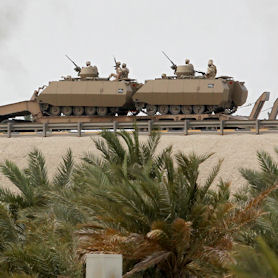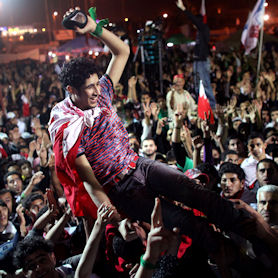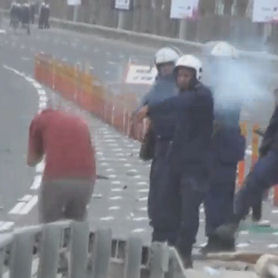Bahrain crisis: ‘Saudi soldier and protester shot dead’
Twelve days ago, Bahrain’s protesters said they would ask for help from Iran if Saudi soldiers entered the country. Will Tehran intervene? Not likely, an expert on Iran tells Channel 4 News.

On Tuesday, more than 1,000 Saudi troops entered the tiny island state, as did soldiers from other Gulf Cooperation Council (GCC) states, including the United Arab Emirates (UAE), Qatar and Kuwait. The troops are from the Gulf countries’ Peninsula Shield Force and Bahrain authorities have themselves sent more than 100 armoured vehicles to Pearl Roundabout, the epicentre of the anti-government protests that have thrown the nation into chaos.
Saudi and fellow Gulf troops entered Bahrain following a request from its neighbour. Riyadh said that “any harm done to the security of a member state is considered a harm done to the security of all GCC members.”
But the leaders of Bahrain’s protesters denounced the deployment of foreign troops, with the largest Shi’ite party, Wefaq, saying that any intervention by Gulf Arab forces is a declaration of war and occupation.
Prediciting the “occupation” on 3 March, opposition leader Hassan Mushaima, said: “If Saudi military interferes in the internal affairs of Bahrain, in this case, the Iranian army has the right to interfere Bahrain affairs to support protesters.
“If Bahrain’s ruling system is resorting to help from Saudi Arabia, in this case it is the right for opposition groups to appeal for help from Iran.”
And on Tuesday, Iran echoed the protesters’ criticism, with Foreign Ministry spokesman Ramin Mehmanparast saying: “The presence of foreign troops and meddling into Bahrain’s internal affairs will only further complicate the issue.”
Hours after the statement, Bahrain’s ambassador to Iran was recalled to Manama.
The presence of US-backed Saudi Arabia in Bahrain is sure to perturb Tehran, but Arshin Dr Adib-Moghaddan from the School of Oriental and African Studies, and an expert on Iranian foreign policy, told Channel 4 News that the island does not have the potential to be another Vietnam, i.e. a proxy war between the US and Iran.
“If there would be a sustained period of confrontation, and systematic killings of the demonstrators, Iran may be dragged into the conflict. [However] I don’t think we would see Iranian boots on the ground; a major diplomatic escalation is more likely,” said Dr Adib-Moghaddan, the author of Iran in World Politics.
“Neither Iran nor the US has an interest in a proxy war. In fact both the Obama administration and the Iranian Foreign Ministry say the same: Bahrainis have legitimate demands that need to be met by the monarchy. It is ironic and indicative of a failed strategy towards Iran, that the country can not be included in a solution to the conflict in Bahrain and elsewhere in the region for that matter.”
Indeed, the White House elected to use non-committal and reticent language when it commented on GCC forces entering Bahrain on Tuesday; rhetoric consistent with its standoffish stance on the Arab revolts in general.
On Tuesday, White House spokesman Tommy Vietor said that the US does not consider the entry of Saudi Arabian security forces into Bahrain an invasion, but urged Bahrain to exercise restraint.
“We urge our GCC partners to show restraint and respect the rights of the people of Bahrain, and to act in a way that supports dialogue instead of undermining it,” Mr Vietor said.
Later, he articultaed the White House’s call for Bahrain to find a political solution to its problems and said the use of force and violence from any side would only worsen the situation.
“One thing is clear: there is no military solution to the problems in Bahrain. A political solution is necessary and all sides must now work to produce a dialogue that addresses the needs of all of Bahrain’s citizens.”
Both Iran and the US find themselves in difficult positions in Bahrain. In the case of the former, a failure to act in Bahrain could be perceived as a display of weakness.
“Iran is likely to step up its rhetoric in accordance with events on the ground in Bahrain. It will use a rhetoric of strength to forestall to be perceived as weak,” said Dr Adib-Moghaddan. And among other concerns for the US, its 5th Fleet’s basing in jeopardy.
But whatever happens in Bahrain, it is unlikely to trigger a physical conflict between Iran and the US: there is too much to lose, said Dr Adib-Moghaddan.
“With Iran, it is first gear: diplomacy, second gear: multilateral/regional diplomacy, third gear: regional ‘gunboat’ diplomacy, and then the options are exhausted.”
Who Knows Who: Bahrain's sectarian gulf

A month of clashes between Shiite protesters and security forces intensified on Sunday, with more than 100 people injured as demonstrators demanded democracy through elections from their Sunni monarch (King Hamad bin Isa Al Khalifa).
Two weeks ago, protesters could hardly have expected to witness the sight of Saudi troops on their soil: Bahrain’s police and armed forces ceased clashes on 19 February, after a week of unrest that saw the death of six anti-government demonstrators. The opposition interpreted this as a retreat and anticipated imminent victory in their bid to topple the incumbent government. They rejoiced on the streets, thinking they had achieved their Tahrir Square moment.
They were mistaken. On Tuesday, Bahrain state TV announced that a three-month state of emergency – martial law – has been declared to try to quell continuing political unrest threatening the monarchy, and King Hamad said in a statement that the nation’s Armed Forces chief is authorised to “take all measures” to crush protests.

And now the bloodshed appears to have returned after a two week hiatus. Officials in Riyadh said a Saudi soldier has been shot dead by a protester, although this was later denied by officials in Manama.
They did confirm, however, the death of a member of Bahrain’s security forces during clashes with thousands of protester. “A member of the security forces passed away in Maameer this evening when he was deliberately run over by one of the rioters,” Bahrain’s Ministry of Information said.
And another report said a protester was killed in clashes with police in the Sitra area of Bahrain, while ominous videos appearing to show protesters being shot, some at point blank range, circulate the internet.
British embassy closed
Meanwhile, the British embassy in Bahrain has closed as fears grow that a bloody crackdown of the protests in the offing. The Foreign Office has advised against all travel to Bahrain.